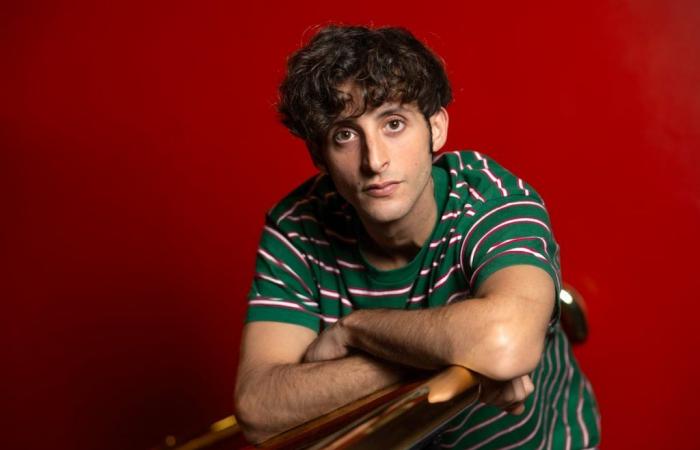Although he started working even before finishing the School of Dramatic Arts and has chained project after project, including his participation in a large production such as Terminator: Dark Fate, Daniel Ibáñez recognizes that he is undoubtedly experiencing an amazing year of luck. To star in Isaki Lacuesta’s film Second prize, which won the Biznaga de Plata at the Malaga Film Festival and in which he played Jota, from the group Los Planetas, is now taking the stage with the show for freedom, in which he plays Miguel Hernández, the goatherd poet who died in 1942, at the age of 32, in Alicante prison, imprisoned by the Franco dictatorship. In both projects, Daniel Ibáñez, the 29-year-old actor from Madrid who was going to be a doctor, not only acts, but also sings. In Second prizegives voice to the themes of Los Planetas, and in for freedomnothing more and nothing less, performs the songs with which Joan Manuel Serrat rescued the figure of the Orihuela poet from oblivion. for freedom It is directed by Gabriel Fuentes and, alongside Daniel Ibáñez, Eva Rubio and Pablo Sevilla work. The performance, which recreates the life and work of the poet with Serrat’s music as the driving force of the plot and which has had the advice of the singer himself, is performed at the Teatro Marquina, in Madrid, until next July 28.
Ask. He has been chaining jobs for some time, but this year seems special. From Jota de los Planetas to Miguel Hernández. What was that double somersault like?
Answer. It has been quite amazing and very exciting, because I have had to deal with the difference in colors between one character and another, but it has been easy for me. Being surrounded by talented people, you feel that the challenge is not a leap into the void, but that I have a good parachute. Telling the life of Miguel Hernández is well worth it all.
Q. In both projects he not only acts, but also sings. Does it do anything else?
R. I have macrame and origami left. Seriously, I sing and act, but there are other jobs by many actors who do real wonders, like my two colleagues in for freedomwhich each unfold into a multitude of characters.
Q. Is it overwhelming to put yourself in the shoes of a man like Miguel Hernández?
R. Yes. After reading a lot about him, especially the biography that José Luis Ferris wrote, we have been discovering that you can hold on to everything that was fundamental in his life, such as poetry, love and struggle. We hope that the public takes away emotion, hope and that the story we tell can shake them.
Q. Did you study Miguel Hernández in high school?
R. Something, but in a somewhat tangential way, not like other poets were studied. I think Miguel Hernández is a somewhat forgotten character whose story has been silenced. The desire to silence him had its effect. Lorca was a martyr, like Hernández, but he died alone and poor in prison and his death did not have the impact that Lorca’s did. It is a shame that a poet with such a background has been vilified.
Q. How does one prepare a real character?
R. Each project has its needs and, in this case, what worried me was checking the weight that the songs had and what they counted on, how they fit into the story and their coherence. We have especially sought for the public to see the light that Miguel Hernández gives off.
Daniel González (EFE)
Q. So, what has been the best discovery you have made about this shepherd poet?
R. I have fallen in love with his tenacity and I would like to vindicate his figure as a combatant poet. He was on the battlefield during the civil war and never stopped writing. At barely 30 years old he reached an impressive level of poetry. I am fascinated by his involvement with life, both ideologically and physically. Sometimes you get the impression that telling the story of Miguel Hernández is something archaic, old and sad, that, in some way, we are going to suffer with it and that is why there is no interest in recovering it. In this montage we look for light and hope, because Miguel Hernández was that, a poet of light and hope. He was a man of whom they say that he always had a smile on his mouth and that he was pure brilliance. I have read that when he died they were unable to close his eyes, and I want to think that perhaps it was because of that enormous capacity that he had to be amazed. This is a quality that I highlight a lot, because I believe that in the face of such an overwhelming world we should never lose the capacity for wonder, because it is the engine of wisdom. I would also like to value his self-taughtness. He is admirable.
Q. Why do you consider that he has been one of the great forgotten ones?
R. No doubt there may have been something to do with class, with him being a simple goat herder. It is probably easier for someone who doesn’t have to think about what to eat to defend his story after the fact. He could never defend himself in the same way as, for example, Lorca, who suffered another horrible tragedy, a crime against humanity. To kill a poet is to kill beauty. The Franco regime simply let Miguel die in prison so as not to create, as in the case of Lorca, another martyr. And that is killing too.
Q. It is also an inquiry into collective memory. What value do you place on memory?
R. Memory is the only thing that gives coherence and perspective to your life. When you cancel the memory you forget who you are, where you come from. Culture has that value. You will never feel orphaned if you have verses like Miguel’s to cling to or songs like Serrat’s. All this is what really makes you find the light, the light that Miguel Hernández radiated.
Q. The one who is not forgotten is Serrat. Is singing his songs an added risk?
R. It is always a risk, but what is a stage risk compared to the life of Miguel Hernández. I was not aware of what Serrat’s music has meant in my life, which I listened to as a child on the radio cassette player in my parents’ car, and suddenly being in his house and having him tell me out loud everything that the creation entailed. of those songs. Joan Manuel has supported me, he has encouraged me and with him by my side everything is easier. He has been very involved in this project.
Q. Has he given you any advice?
R. The first thing he told me was: ‘Be free to do with me what I did with Miguel Hernández.’ He told me not to feel intimidated, to use what interested me in my songs to tell this particular story. He gave me a lot of encouragement and freedom.
Q. You were going to be a doctor. How did you get into acting?
R. My father is a doctor and medicine and acting were my two inspirations. In the end I decided on the most stable one. [suelta una carcajada].
Q. Miguel Hernández was a man of profound left-wing ideas. What is his opinion on the rise of the far right in Europe?
R. It scares me a lot, I think it should worry us all. There we have the example of Miguel Hernández and his fight for beauty and life. There is no choice but to fight. No one has to take away your desire and enthusiasm to be amazed and you will never close your eyes, even if you die, like what happened to him.
All the culture that goes with you awaits you here.
Subscribe
Babelia
The literary news analyzed by the best critics in our weekly newsletter
RECEIVE IT






